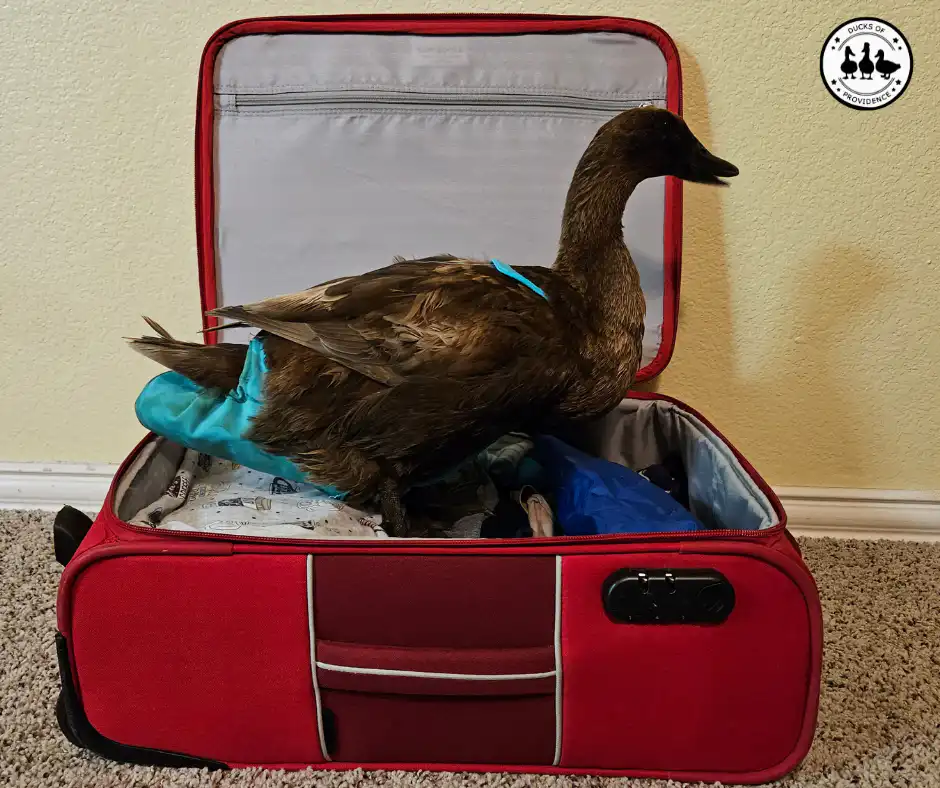
Vacation and Ducks: What Do You Do with Your Pet Ducks When Travelling?
Last updated: January 15th, 2026
Vacation and ducks – how does this fit together? Today, we’re diving into a topic that might ruffle a few feathers: what to do when you need to travel but have pet ducks. Vacation and As much as we adore our quacking companions, there are times when we must venture away from our duck haven. So, how can we ensure our ducks are well taken care of while we’re on vacation? Whether it’s arranging for a sitter, boarding them, or traveling with ducks, let’s waddle through some practical steps together!
Ducks of Providence is free, thanks to reader support! Ads and affiliate links help us cover costs—if you shop through our links, we may earn a small commission at no extra cost to you. Thanks for helping keep our content free and our ducks happy! 🦆 Learn more
Find a duck sitter for the time you are on vacation but can’t take them you
The first step is to find someone who can care for your ducks while you’re away. This could be a friend, neighbor, or professional pet sitter with experience in handling ducks. Make sure they are familiar with your flock and know the ins and outs of duck care. It’s always a good idea to have them visit a few times before you leave so your ducks can get accustomed to them.
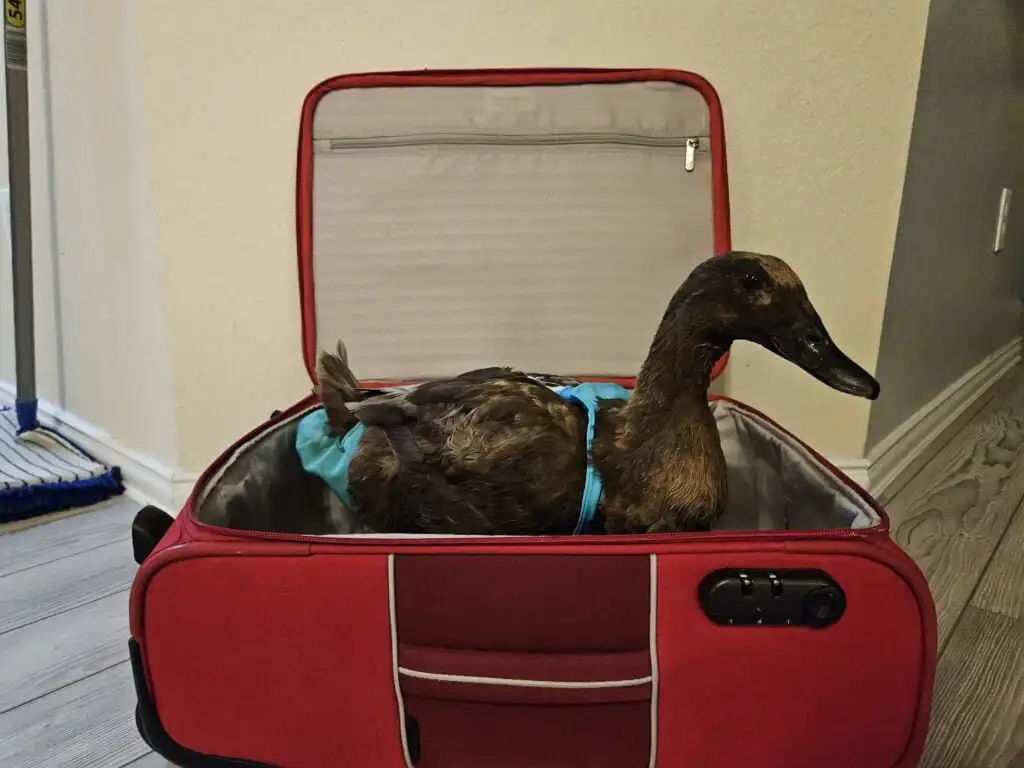
Tip: Create a detailed care guide for your sitter. Include information on feeding, cleaning, health checks, and any special quirks your ducks might have. And don’t forget to leave your contact details and the number of a local vet.
Potential Caregivers for Your Ducks
When planning to travel, having a list of potential caregivers for your ducks can help ensure they receive the best possible care in your absence. Here are some options to consider:
1. Friends and Family
- Close Friends: People you trust and who have some familiarity with animals.
- Family Members: Relatives who live nearby and are willing to take on the responsibility.
2. Neighbors
- Animal-loving Neighbors: Neighbors who enjoy animals and are interested in helping out.
- Community Members: People in your local community who may have experience with ducks or other pets.
3. Professional Pet Sitters
- Experienced Pet Sitters: Professionals who specialize in caring for birds and have experience with ducks.
- Pet Sitting Services: Agencies that offer pet sitting and have staff trained to care for various animals, including ducks.
4. Veterinary Technicians
- Vet Techs: Veterinary technicians or assistants who might be interested in pet sitting as a side job.
5. Local Farms and Animal Sanctuaries
- Farm Owners: Local farmers who have experience with poultry and can provide care.
- Animal Sanctuaries: Facilities that might offer temporary boarding services for ducks.
6. Youth in Your Community
- Responsible Teens: Teenagers looking for pet-sitting jobs, especially those involved in 4-H or similar programs.
- High School/College Students: Students studying veterinary science or animal care who may be looking for practical experience.
7. House Sitters
- Professional House Sitters: Individuals who offer house-sitting services and can stay at your home, taking care of both your property and your ducks.
- TrustedHousesitters: Websites like TrustedHousesitters that connect homeowners with sitters experienced in pet care.
8. Bird Clubs and Associations
- Local Bird Clubs: Members of bird clubs who may have the knowledge and experience to care for ducks.
- Poultry Associations: Members of poultry associations who are familiar with the needs of ducks.
9. Online Pet Sitting Platforms
- Rover.com: A platform where you can find local pet sitters with experience in bird care.
- Care.com: Another site to find caregivers who offer pet sitting services, including for birds and ducks.
10. Facebook Groups and Forums:
- Join online communities like Facebook groups or forums such as Backyard Chickens. These platforms are great for finding experienced duck sitters and getting recommendations from fellow duck enthusiasts.
11. Veterinary Clinics
- Clinic Staff: Veterinary clinic staff who might offer pet sitting services on the side.
- Clinic Recommendations: Ask your vet for recommendations; they often know reliable pet sitters.
How Much Do You Pay a Duck Sitter?
The cost of hiring a duck sitter can vary depending on several factors, including location, the sitter’s experience, and the level of care required. Here are some general guidelines to help you budget for a duck sitter:
- Professional Pet Sitters: On average, professional pet sitters charge between $15 and $30 per visit. If multiple visits are needed per day, this cost can add up. Some sitters may offer discounts for extended periods.
- House Sitters: If you prefer a house sitter who will stay at your home and provide round-the-clock care, the cost can range from $50 to $100 per day. This option ensures that your ducks receive constant attention and care.
- Friends or Neighbors: If you ask a friend or neighbor to look after your ducks, you might negotiate a lower rate or offer a small daily fee, such as $10 to $20 per visit. It’s also nice to show appreciation with a thank-you gift or favor.
- Farm Sitters: Specialized farm sitters who are experienced in caring for a variety of animals might charge between $25 and $50 per day, depending on the number of ducks and the complexity of their care needs.
Tip: Always discuss payment details upfront and ensure that your sitter understands the responsibilities involved. Clear communication helps avoid misunderstandings and ensures your ducks receive the best possible care.
Find a Trustworthy Duck Sitter
Look for Experience: Choose someone familiar with duck care. This could be a friend, neighbor, or a professional pet sitter. Look for individuals who have experience with birds, especially waterfowl, to ensure they understand the unique needs of ducks.
Background Check: If you’re hiring a professional, check their references and reviews. Ask for recommendations from other duck owners or local animal care organizations.
Conduct an Interview: Meet with potential sitters to discuss your ducks’ specific needs and your expectations. This is a good opportunity to gauge their comfort level and knowledge about ducks.
Introduce Them to Your Ducks
Multiple Visits: Have the sitter visit a few times before you leave so your ducks can get accustomed to them. This helps reduce stress for both your ducks and the sitter.
Observation: Watch how the sitter interacts with your ducks. Ensure they handle them gently and follow your care instructions.
Provide Training: If the sitter is new to duck care, spend some time teaching them the basics. Show them how to feed, clean, and handle your ducks properly.
Prepare Their Living Space
Ensure Security: Make sure the living area is secure and free of hazards. Check for any gaps or weak spots in the fencing and repair them.
Stock Up: Provide enough food, water, and bedding to last your entire trip. It’s better to have extra supplies than to risk running out.
Install a Camera: If possible, set up a camera to monitor your ducks remotely. This will give you peace of mind and allow you to check on them periodically. We have three ring cameras that help us monitoring our ducks when we are not home.
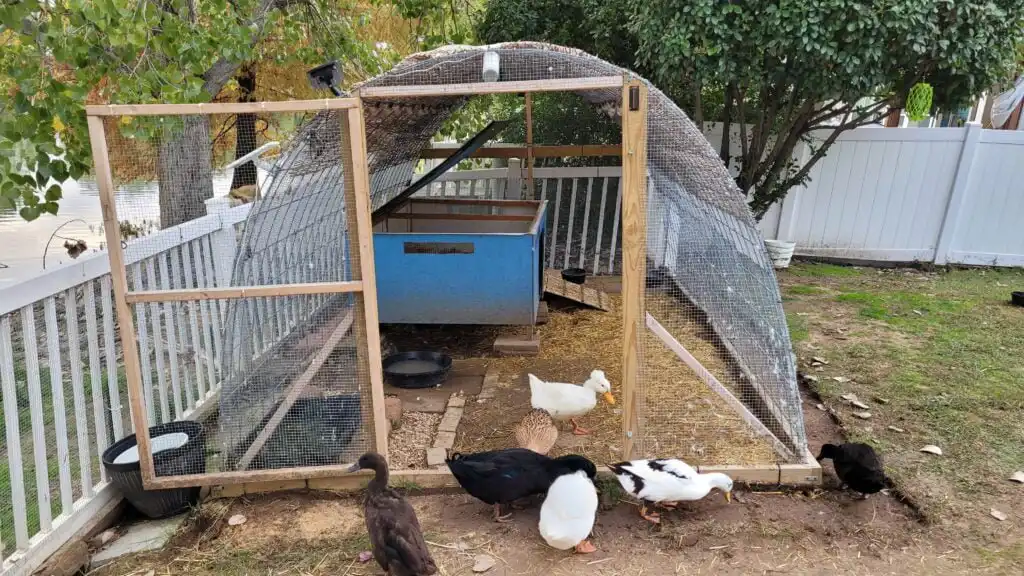
Automate Where Possible
Technology can be a lifesaver! Automatic feeders and waterers can help maintain a consistent feeding schedule. These gadgets reduce the daily workload for your sitter and ensure your ducks always have access to fresh food and water.
Tip: Test any new equipment before you leave to make sure everything works perfectly, and your ducks are comfortable with it.
Health and Safety Checks
Before you leave, do a thorough health check on each duck. Look for any signs of illness or injury and address these promptly. Make sure your ducks are up-to-date on any necessary vaccinations.
First Aid Kit for Your Duck Sitter
Tip: Leave a small emergency kit with your sitter, including basic first aid supplies and instructions on what to do in case of an emergency.
Ensure your duck sitter has a well-stocked first aid kit with all the essentials, just in case. Make sure they know to call you immediately in case of an emergency, and reassure them that you’ll guide them through any necessary steps. Dont’ have a first aid kit yet? Read our article 31 Must-have Items for Your Pet Duck First Aid Kit.
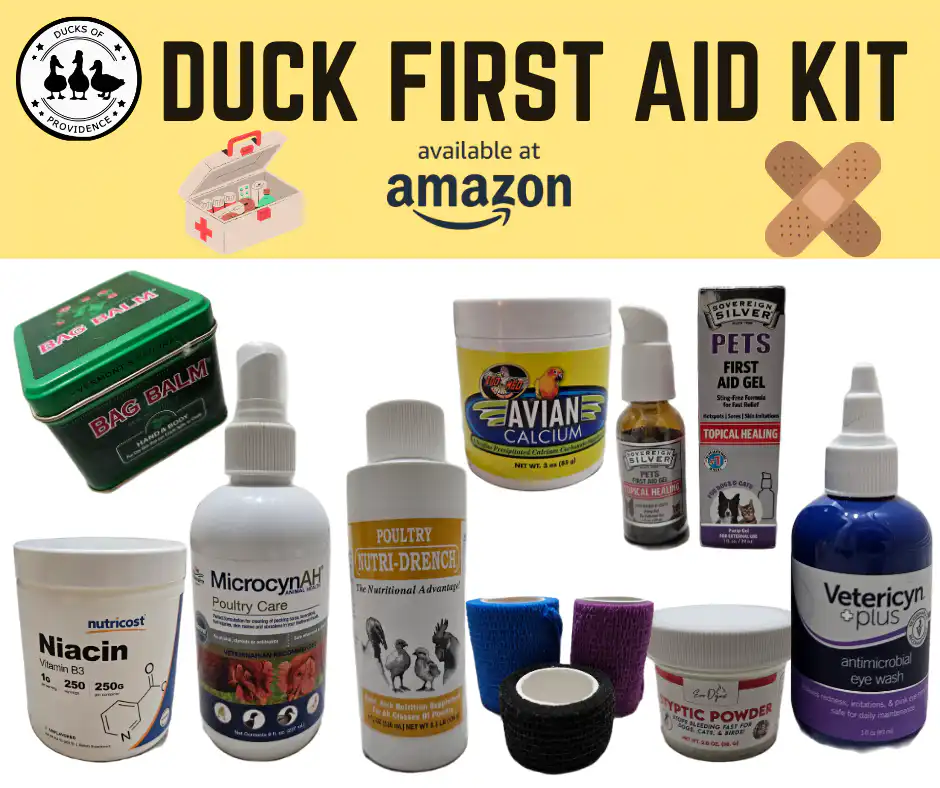
Duck First Aid Kit
Whether you’re a seasoned duck keeper or just starting your quacking journey, having reliable first aid supplies on hand is essential. Don’t wait until an emergency strikes—be prepared and proactive in safeguarding the health of your feathered companions.
Keep Your Ducks Routine While You Are Away
Ducks are creatures of habit and can get stressed if their routine is disrupted. Ensure your sitter understands the importance of maintaining their regular schedule, including feeding times, bath time, and bedtime.
Tip: Write down your ducks’ daily routine and share it with your sitter. A little consistency goes a long way in keeping your ducks happy and stress-free.
Communication with you Duck Sitter is Key
Stay in Touch: Arrange for regular updates, photos, or videos from the sitter. This helps you stay connected with your ducks and ensures you’re aware of any issues that might arise.
Communication Plan: Agree on how often and through which channels (email, text message, phone calls) you will stay in contact. Ensure the sitter knows how to reach you in case of an emergency.
Relax and Enjoy Your Trip While you are on Vacation without Your Ducks
Finally, trust that you’ve prepared everything to the best of your ability. With a reliable sitter, a well-prepared living space, and clear instructions, your ducks will be just fine. Take some time to enjoy your travels, knowing your feathered family is in good hands.
Tip: Bring back a small souvenir for your ducks! Maybe a new toy or some tasty treats to show them you were thinking of them.
Our Experience on Vacation and Ducks: Trusted Neighbor Care
When it comes to jet-setting off on our adventures, one big concern that always quacked at the back of our minds was, “Who’s going to take care of our beloved ducks?” Thankfully, fate smiled upon us in the form of our wonderful neighbor, Quack-lyn.
Quack-lyn isn’t just any neighbor—she’s become an honorary member of our duck-loving family. With her warm smile and genuine love for all things feathered, she eagerly stepped up to the plate to watch over our flock whenever we spread our wings for a small getaway.
What makes this arrangement even more delightful is the involvement of our neighbors’ two delightful kids. These little duck enthusiasts were practically raised alongside our feathered friends, making them the perfect partners in duckie crime. From giggling at their silly antics to proudly showing off their newfound duck-feeding skills, these kiddos have truly embraced the role of junior duck wranglers.
Before we bid adieu to our ducks and packed our bags, we made sure to host a crash course in “Duck Care 101” for Quack-lyn and her dynamic duo. Armed with a detailed rundown of our ducks’ daily routine, their dietary needs, and the secret handshake that gets them all waddling happily into their cozy coop at night, our neighbors were fully equipped to handle the feathered brigade.
Of course, no duck-sitting operation would be complete without the essential supplies. We loaded up Quack-lyn arms with bags of duck food, bundles of fresh bedding, and enough treats to keep our feathered friends quacking with delight.
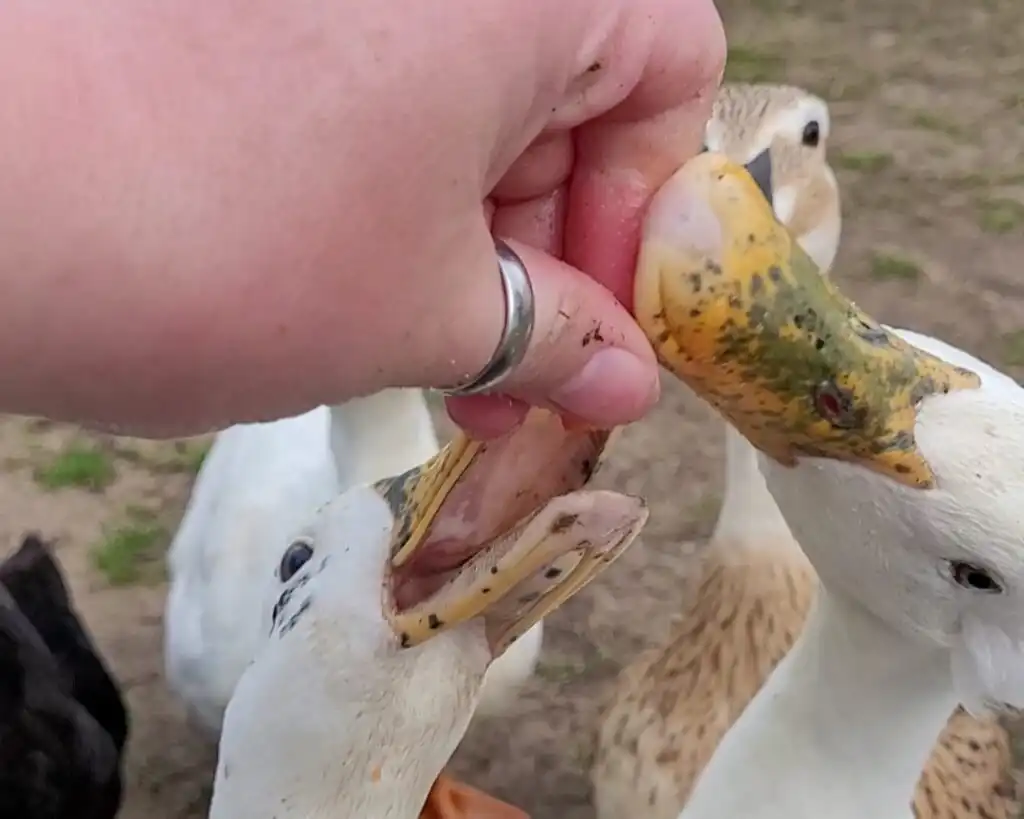
To sweeten the deal and show our gratitude for their unwavering duck devotion, we decided to compensate Quack-lyn and her helpers for their time and efforts. After all, a little extra pocket money for ice cream runs and duck-themed doodads is always a welcome treat, right?
And let’s not forget about the magic of modern technology! We hooked up our coop and pen with a ring security camera system, ensuring that we could keep a watchful eye on our ducks’ antics even when we were halfway around the world.
In the end, entrusting our ducks to the loving care of our neighbors turned out to be more than just a practical solution—it became a heartwarming testament to the power of community and the joy of sharing our passion for all things quacky. Who knew that a simple act of neighborly kindness could bring happiness to our ducks and hearts? 🦆💕
Boarding Your Ducks while You are Traveling
Boarding your ducks at a professional facility can be an excellent option if you’re unable to find a reliable sitter or if you prefer a more structured environment for your feathered friends. This chapter will guide you through the process of finding, preparing, and ensuring a safe and comfortable boarding experience for your ducks.
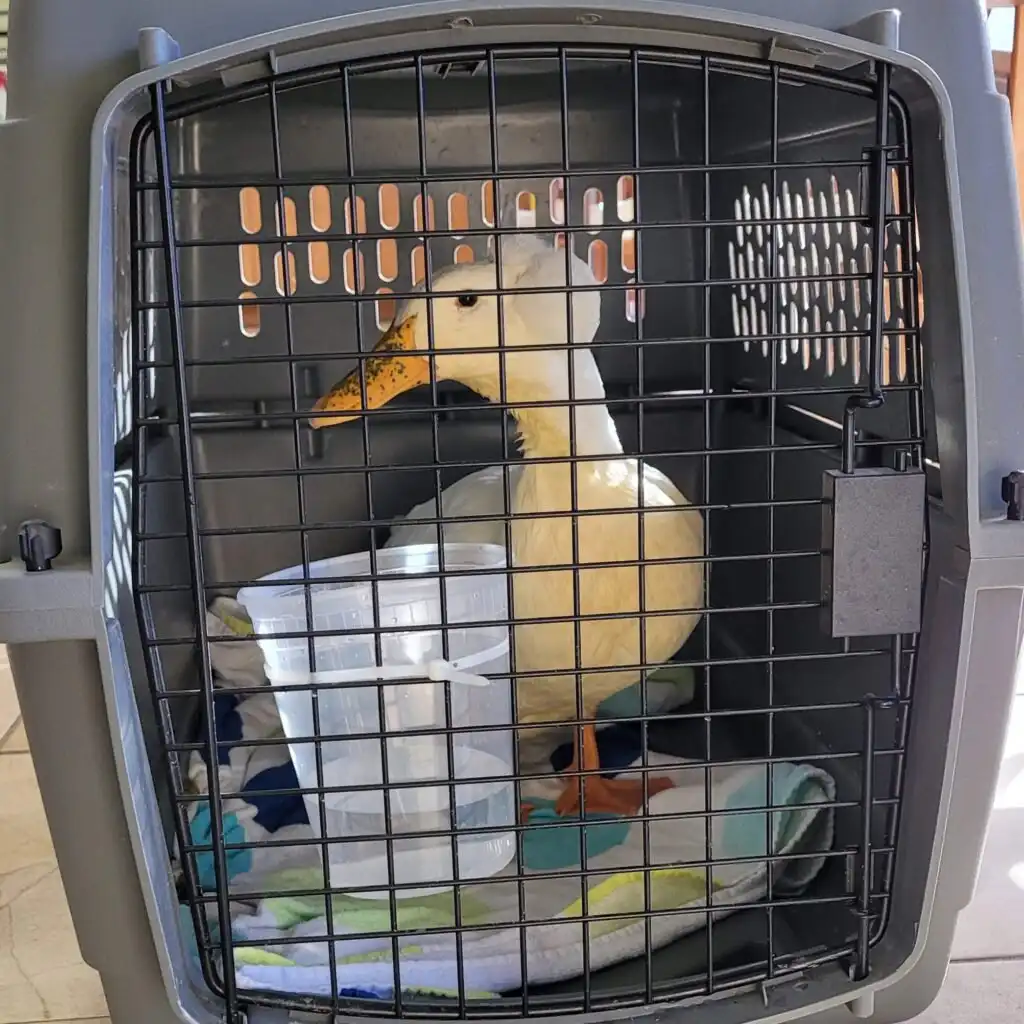
Research Boarding Facilities
- Local Farms: Some local farms offer boarding services for ducks and other poultry. These can provide a familiar environment for your ducks.
- Animal Sanctuaries: Many animal sanctuaries have the resources and experience to care for ducks.
- Specialized Pet Boarding Services: Look for facilities that specifically cater to birds and small animals. These places often have the necessary expertise and accommodations for ducks.
Tip: Use online resources, such as Google, Yelp, or specialized directories, to find and review boarding facilities near you.
Visit and Evaluate the Facilities
- Cleanliness: Ensure the facility is clean and well-maintained. This helps prevent the spread of diseases and ensures your ducks stay healthy.
- Security: Check for secure enclosures that protect against predators and escape. The facility should have proper fencing and covered areas.
- Space: Ducks need enough space to move around, swim, and engage in natural behaviors. Ensure the boarding facility provides adequate space.
- Staff Knowledge: Speak with the staff to gauge their experience and knowledge of duck care. They should be familiar with the specific needs of ducks, including diet, habitat, and health care.
- Emergency Protocols: Ask about the facility’s emergency procedures. They should have a plan for dealing with medical issues, severe weather, and other emergencies.
Tip: Take a tour of the facility before making a decision. This allows you to see firsthand how the ducks are housed and cared for.
Prepare for Boarding
- Health Check: Ensure your ducks are healthy and up-to-date on any necessary vaccinations before boarding. Provide the facility with a health certificate from your vet if required.
- Pack Essentials: Prepare a package with all the necessary items for your ducks’ stay, including:
- Food: Provide enough of your ducks’ regular food to last the entire boarding period.
- Bedding: Supply familiar bedding to make your ducks more comfortable.
- Toys and Enrichment: Include some of their favorite toys or items to keep them entertained and reduce stress.
- Health and Care Instructions: Write detailed instructions on feeding, cleaning, and any special care your ducks require.
- Emergency Contacts: Provide the boarding facility with your contact information, as well as that of a local vet and any other emergency contacts.
Tip: Label all your ducks’ items clearly with their names and your contact information to avoid any mix-ups.
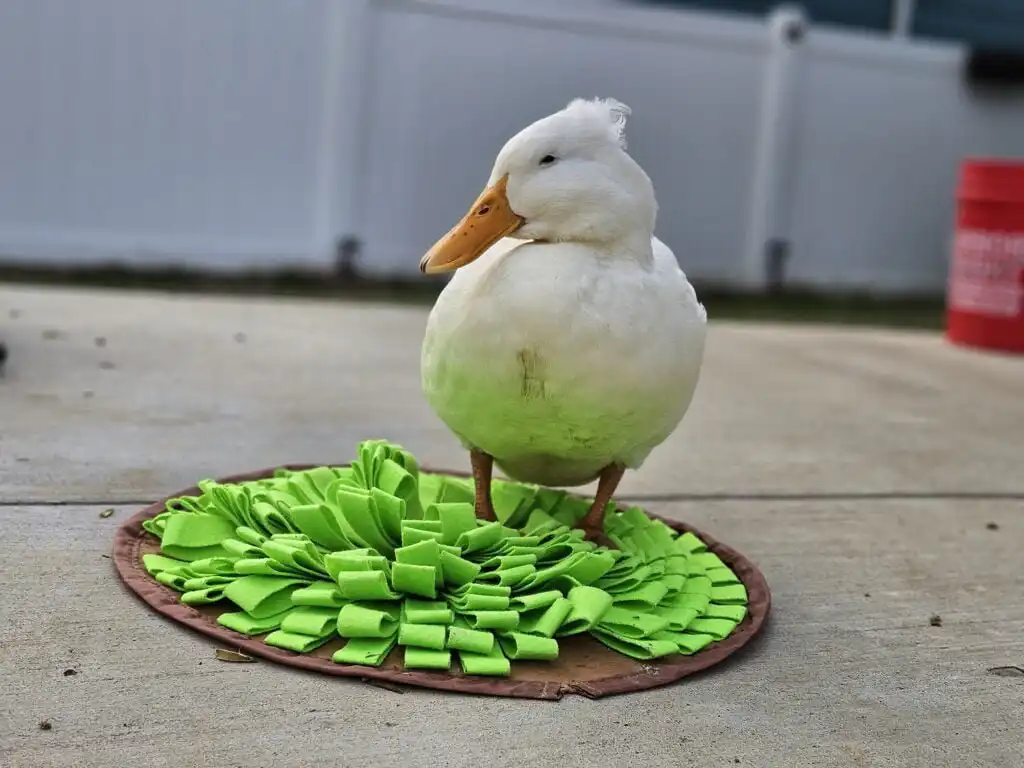
Health and Safety
- Pre-Boarding Checkup: Have your ducks checked by a vet before boarding to ensure they are healthy and free from parasites or illnesses.
- Daily Health Checks: Confirm that the boarding facility performs daily health checks and can recognize signs of illness or distress in ducks.
- Isolation Protocols: Inquire about their protocols for isolating any sick birds to prevent the spread of illness.
Tip: Ask the facility how they handle health emergencies and if they have a vet on call.
Communication and Updates
- Regular Updates: Arrange for the boarding facility to provide you with regular updates on your ducks. This can include photos, videos, or daily reports.
- Emergency Contact: Ensure the facility knows how to reach you quickly in case of an emergency.
Tip: Set up a preferred method of communication (phone, email, text) to stay informed about your ducks’ well-being.
After the Boarding Experience
- Inspect Your Ducks: Upon picking up your ducks, inspect them for any signs of stress or illness. Check their overall condition, including their feathers, weight, and behavior.
- Thank the Staff: If you’re satisfied with the care provided, express your gratitude to the staff. This helps build a good relationship for future boarding needs.
- Review and Feedback: Leave a review of your experience to help other duck owners find reliable boarding options and provide constructive feedback to the facility.
Tip: Document any issues or concerns and discuss them with the facility management to ensure they are addressed for future visits.
Boarding your ducks can be a safe and convenient option when you need to travel. By thoroughly researching and preparing for the boarding experience, you can ensure your feathered friends are well cared for in your absence.
Have you ever boarded your ducks? Share your experiences and tips in the comments below—we’d love to hear from you!
Traveling with Your Ducks
Traveling with your ducks can be an adventurous and rewarding experience. Whether you’re going on a short trip or a longer journey, taking your feathered friends along requires careful planning and preparation to ensure their comfort and safety. Here’s a detailed guide to help you travel with your ducks smoothly.
Plan Ahead
- Pet-friendly Accommodations: Research and book places that welcome ducks and other pets. Many campgrounds, some hotels, and vacation rentals may allow ducks.
- Travel Route: Plan your route with frequent stops for rest and hydration. If you’re traveling by car, find rest areas where you can safely let your ducks out for a break.
- Travel Carrier: Invest in a secure and comfortable travel carrier for your ducks. It should be well-ventilated, spacious enough for them to move around, and easy to clean. Pet carriers are great and safe for transporting ducks in the car.
Tip: Use a carrier that your ducks are already familiar with to reduce stress during travel.
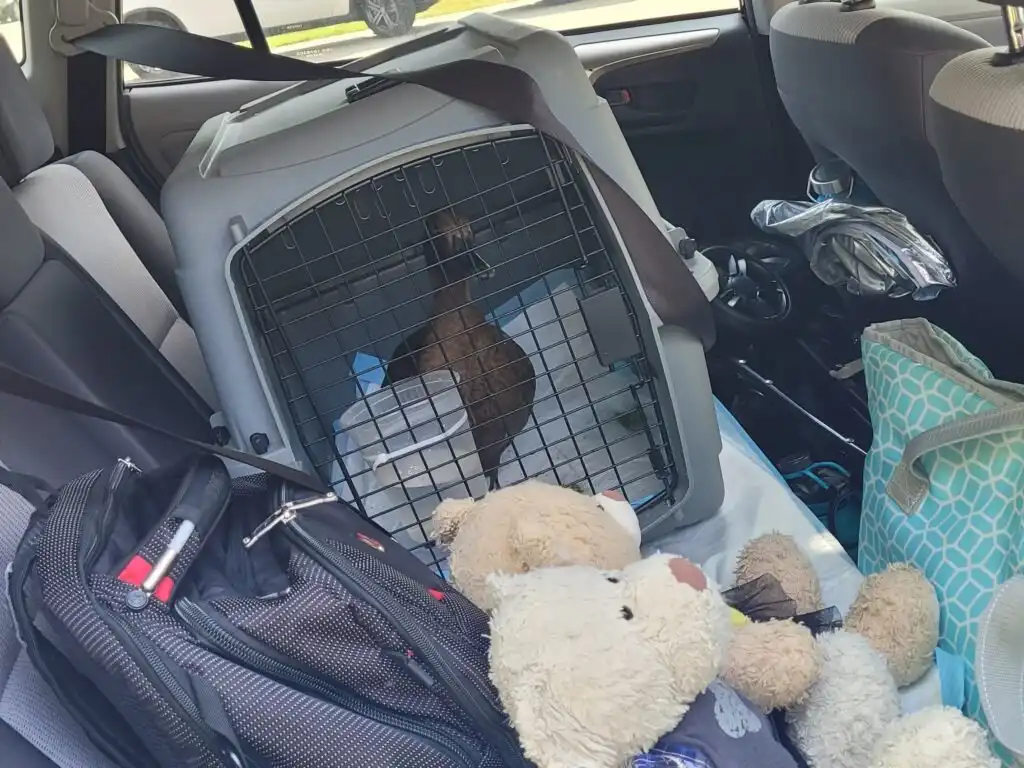
On the Road
- Frequent Stops: Allow your ducks to stretch and relax during long drives. Make sure they have access to food and water during these breaks.
- Comfort Items: Bring along familiar items like their favorite toys, blankets, or even a small piece of their bedding to help them feel more at ease.
- Safety First: Ensure the travel carrier is securely fastened in the vehicle to prevent it from moving around. Never leave your ducks unattended in a hot car.
Tip: Keep the car at a comfortable temperature and avoid direct sunlight on the carrier.
Health and Safety
- Travel Health Kit: Pack a basic first aid kit and any necessary medications your ducks might need. Include antiseptic, bandages, and any specific treatments they might require.
- Vet Contact: Know where the nearest vet is at your destination and along your route. Keep their contact information handy in case of emergencies.
- Hydration and Food: Ensure your ducks stay hydrated and have access to their regular food. Pack enough for the entire trip plus a little extra just in case.
Tip: Offer treats during breaks to keep your ducks happy and comfortable.
Routine Maintenance
- Keep it Consistent: Try to maintain their regular feeding and sleeping schedule as much as possible. Consistency helps reduce stress and keeps your ducks comfortable.
- Monitor Their Health: Keep an eye on your ducks for any signs of stress or illness during the trip. Look for changes in behavior, appetite, or physical condition.
Tip: Spend some quiet time with your ducks during breaks to reassure them.
Arrival at Your Destination
- Set Up Quickly: As soon as you arrive, set up a safe and comfortable area for your ducks. Ensure they have access to food, water, and a familiar environment. A foldable playpen is a great option for creating a secure pen for your ducks in a hotel or other location.
- Supervise: Monitor your ducks closely as they explore their new surroundings. Ensure the area is secure and free from hazards.
- Relaxation Time: Allow your ducks some time to rest and recover from the journey before engaging in any new activities.
Tip: Bring some familiar items from home to help your ducks adjust to the new environment more easily.
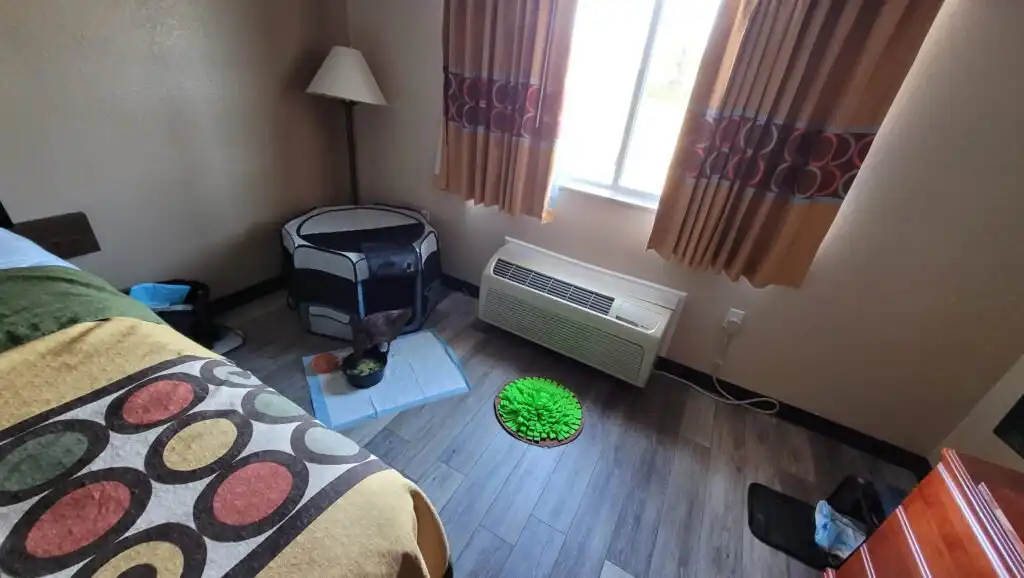
Enjoy Your Trip Together
- Explore Safely: If you plan to let your ducks explore outdoors, ensure the area is safe and supervise them at all times. Be mindful of potential predators and hazards. A pet stroller is perfect for going on adventures, allowing your ducks to enjoy the sights and sounds safely.
- Bonding Time: Use the travel experience as an opportunity to bond with your ducks. Spend quality time together, whether it’s during the journey or at your destination.
Tip: Capture the moments! Take photos and videos of your travel adventures with your ducks to cherish the memories.
Traveling with your ducks can be a fun and enriching experience, both for you and your feathered companions. However, it’s important to note that such an endeavor is only practical if you are traveling with a small number of ducks. Managing a larger flock on the road can be incredibly challenging, both logistically and in terms of ensuring their well-being. For larger flocks, alternative care options, such as boarding or hiring a professional sitter, might be more feasible.
Krümel’s Road Trip
Krümel joined us on a road trip from Texas to Michigan. We stopped in Memphis, visited Graceland, and partied in Nashville. At our friend’s farm, Krümel enjoyed grassy pastures and pond swims. With her in a stroller, she stole the show everywhere we went. Quack-tastic memories were made! 🦆🚗💨
But this is a story for another day…

Have you ever traveled with your ducks? Share your experiences and tips in the comments below—we’d love to hear from you!
Happy travels and happy quacking! 🦆✨
